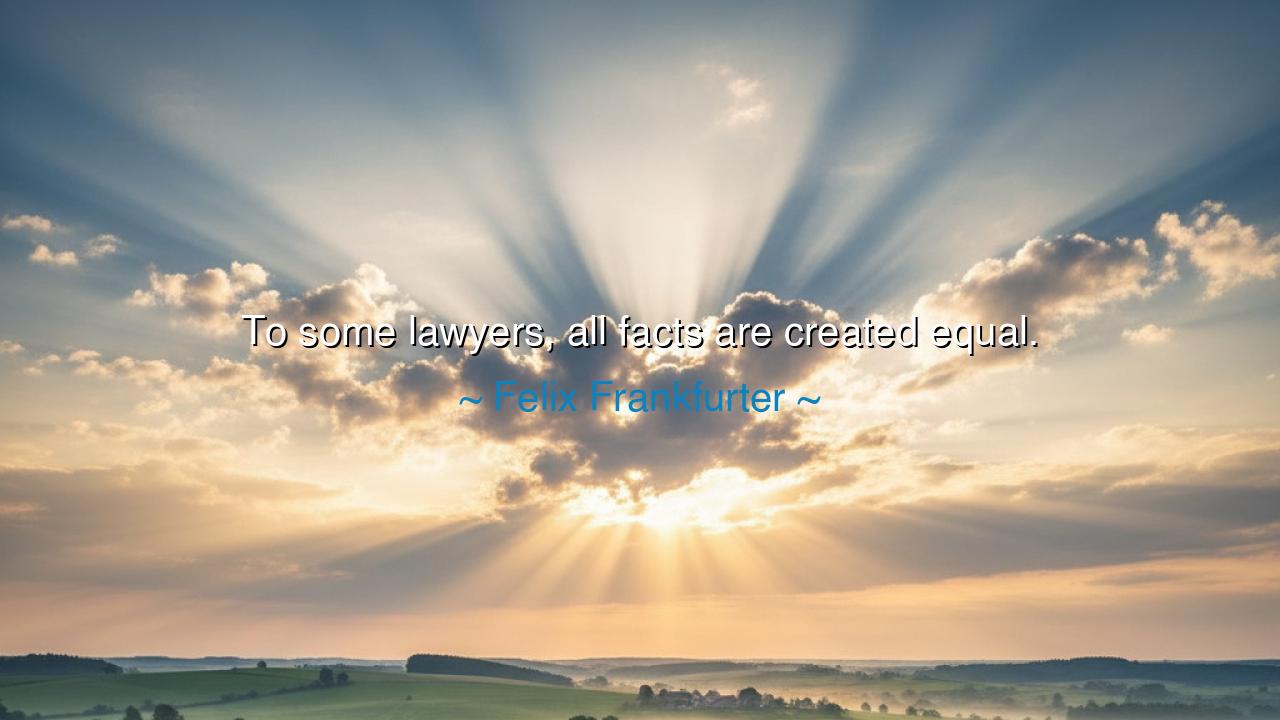
To some lawyers, all facts are created equal.






Hear, O seeker of wisdom, the voice of Felix Frankfurter, judge and scholar, who proclaimed with sharp clarity: “To some lawyers, all facts are created equal.” This is no idle remark, but a warning, a lamp shining upon the blindness that sometimes cloaks the halls of justice. For in this saying lies a truth both subtle and profound: not every fact carries the same weight, not every detail bears the same consequence, and to treat them all as equal is to lose the path of true judgment.
The heart of Frankfurter’s wisdom is this: a lawyer who drowns in a sea of facts, weighing each with the same hand, forgets that justice is not found in enumeration but in discernment. One may pile a mountain of trivial truths, yet if the single truth that matters is ignored, the scales of justice tilt toward folly. To confuse noise with meaning, to place the feather and the stone as if they bore equal burden, is to betray both the law and the soul of truth itself.
History offers many lessons on this blindness. Recall the trial of Socrates, who stood before the Athenian jury accused of corrupting the youth and dishonoring the gods. His accusers summoned many facts, each small and seemingly damning: that he asked questions that unsettled the young, that he challenged the tales of Homer, that he dared to question authority. Yet none of these so-called facts bore the true weight of justice. The jury, treating all as equal, condemned him. And thus Athens silenced its wisest son, mistaking shadows for substance, mistaking triviality for truth.
Another tale emerges from the annals of America: the trial of Sacco and Vanzetti in the 1920s. These immigrants were accused of robbery and murder, and the courtroom was filled with testimony, with countless facts—some relevant, many not. Their ethnicity, their political beliefs, their foreign tongues were weighed as though they mattered as much as evidence of guilt or innocence. The jury and judge, blinded by prejudice and unable to separate the vital from the trivial, condemned them. Long after, history has judged differently, remembering them not as villains but as martyrs to a justice warped by indiscriminate facts.
Mark this well, O listener: the art of wisdom lies not in gathering all facts, but in discerning which truths carry the weight of justice. A thousand details may surround the case, but only a few shine with the light of what is essential. To treat every fact as equal is to be led astray, to confuse the whisper of irrelevance with the thunder of truth. Thus Frankfurter speaks not only to lawyers, but to all who would seek wisdom in a world thick with voices and clutter.
Let this lesson guide your steps: in your judgments—whether of others, of yourself, or of the world—learn to separate the vital from the trivial. Do not let gossip weigh as heavily as truth, nor fleeting appearances stand as strong as character. In the councils of life, choose carefully the truths upon which you stand. For discernment is the heart of wisdom, and without it, one is like a sailor steering by every star at once, doomed to wander without course.
Therefore, cultivate the discipline of the mind. Listen with patience, but weigh with discernment. Ask: which facts reveal the essence, and which merely cloud the sight? Let not the trivial consume your strength, nor the irrelevant poison your justice. For the world is filled with noise, and only those who know how to hear the essential will walk with clarity and power.
Thus, remember Frankfurter’s teaching: though all facts exist, not all are equal. Choose wisely which truths to hold, and in doing so, you will not be lost in shadows, but will walk in the radiant path of wisdom and justice.






AAdministratorAdministrator
Welcome, honored guests. Please leave a comment, we will respond soon